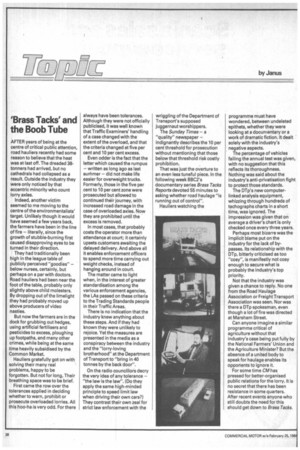'Brass Tacks' and the Boob Tube
Page 40

If you've noticed an error in this article please click here to report it so we can fix it.
AFTER years of being at the centre of critical public attention, road hauliers recently had some reason to believe that the heat was at last off. The dreaded 38tonners had arrived, but no cathedrals had collapsed as a result. Outside the industry they were only noticed by that eccentric minority who count lorry axles.
Indeed, another victim seemed to me moving to the centre of the environmentalists' target. Unlikely though it would have seemed a few years back, the farmers have been in the line of fire — literally, since the growth of stubble-burning first caused disapproving eyes to be turned in their direction.
They had traditionally been high in the league table of publicly perceived "goodies" — below nurses, certainly, but perhaps on a par with doctors. Road hauliers had been near the foot of the table, probably only slightly above child molesters. By dropping out of the limelight they had probably moved up above producers of video nasties.
But now the farmers are in the dock for grubbing out hedges, using artificial fertilisers and pesticides to excess, ploughing up footpaths, and many other crimes, while being at the same time heavily subsidised by the Common Market.
Hauliers gratefully got on with solving their many real problems, happy to be forgotten. But not for long, Their breathing space was to be brief.
First came the row over the tolerances applied in deciding whether to warn, prohibit or prosecute overloaded lorries. All this hoo-ha is very odd. For there always have been tolerances. Although they were not officially publicised, it was well known that Traffic Examiners' handling of a case changed with the extent of the overload, and that the criteria changed at five per cent and 10 per cent excess.
Even odder is the fact that the letter which caused the rumpus — written as long ago as last sunimer — did not make life easier for overweight trucks. Formerly, those in the five per cent to 10 per cent zone were prosecuted but allowed to continued their journey, with increased road damage in the case of overloaded axles. Now they are prohibited until the excess is removed.
In most cases, that probably costs the operator more than attendance at court; it certainly Upsets customers awaiting the delayed delivery. And above all it enables enforcement officers to spend more time carrying out weight checks, instead of hanging around in court.
The matter came to light when, in the interest of greater standardisation among the various enforcement agencies, the LAs passed on these criteria to the Trading Standards people in their Traffic Areas.
There is no indication that the industry knew anything about these steps. And if they had known they were unlikely to rejoice. Yet the measures are presented in the media as a conspiracy between the industry and the "lorry-loving brotherhood" at the Department of Transport to "bring in 40 tonnes by the back door".
On the radio councillors decry the very idea of any tolerance — "the law is the law". (Do they apply the same high-minded principle to speed limit law when driving their own cars?) They contrast their own zeal for strict law enforcement with the wriggling of the Department of Transport's supposed juggernaut worshippers.
The Sunday Times — a "quality" newspaper — indignantly describes the 10 per cent threshold for prosecution without mentioning that those below that threshold risk costly prohibition.
That was just the overture to an even less tuneful piece. In the following week BBC2's documentary series Brass Tacks Reports devoted 55 minutes to asking whether road haulage "is running out of control".
Hauliers watching the programme must have wondered, between undeleted epithets, whether they were looking at a documentary or a work of dramatic fiction. It dealt solely with the industry's negative aspects.
The percentage of vehicles failing the annual test was given, with no suggestion that this reflects its thoroughness. Nothing was said about the industry's anti-privatisation fight to protect those standards.
The DTp's new computerlinked analysis equipment, whizzing through hundreds of tachographs charts in a short time, was ignored. The impression was given that on average a driver's chart is only checked once every three years.
Perhaps most bizarre was the implicit blame put on the industry for the lack of bypasses. Its relationship with the DTp, bitterly criticised as too "cosy", is manifestly not cosy enough to secure what is probably the industry's top priority.
Not that the industry was given a chance to reply. No one from the Road Haulage Association or Freight Transport Association was seen. Nor was there a DTp spokesman, even though a lot of fire was directed at Marsham Street.
Can anyone imagine a similar programme critical of agriculture without that industry's case being put fully by the National Farmers' Union and the Agriculture Minister? But the absence of a united body to speak for haulage enables its opponents to ignore it.
For some time CM has pressed for better-organised public relations for the lorry. It is no secret that there has been resistance in some quarters. After recent events anyone who still doubts the need for this should get down to Brass Tacks.
































































































